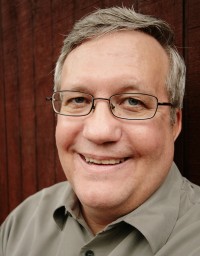Hard of listening
In the early 1990s my Grandma Adams, who had been a widow for several years, began to hang out with a widower named Bob. Grandma and Bob got along famously. They complemented one another: Grandma was hard of hearing and Bob was almost blind. My brother tells a story about joining them one night at a restaurant. Grandma, Bob and my brother were just tucking into steaks and baked potatoes when an amiable fellow approached the table. His demeanor was that of a longtime friend, and he talked to Bob and Grandma for several minutes. Grandma and Bob nodded and smiled as if they knew what was going on.
After the gentleman left the table, Bob asked, "Who was that man?" Grandma replied, "I don't know—what did he say?"
Grandma has been gone for years now, but this story remains a family favorite. We laugh freely about it because we are not laughing at Grandma (she loved the tale herself). We don't assign to Grandma any moral responsibility for her hearing loss and its sometimes amusing (and sometimes frustrating) consequences. Her physical capacity to hear had simply worn out.
Read our latest issue or browse back issues.
But blame can be associated with the failure to hear. Think of Stephen in Acts 7:51, railing at an audience of religious officials: "You stiff-necked people, uncircumcised in heart and ears, you are forever opposing the Holy Spirit . . ." And when Jesus frames a parable with the comment, "Let those with ears to hear listen," he is intimating that there is some element of moral or spiritual choice behind success or failure in hearing and understanding the parables.
Is hearing or the failure to hear a matter of responsibility and culpability, or is it not? Maybe another family story will help sort this out. Eight years ago, I suffered an ear infection that led to a puncturing of the eardrum. A doctor wanted to test how much damage had been done, so I was ushered into a sound-proof booth and administered a number of tests. When we were finished, I asked the technician about the results. She replied that, for a 45-year-old man, my hearing was slightly above average.
"Well, isn't that interesting," I said. "Now I have medico-scientific proof that my wife and daughter are wrong. They think I'm getting hard of hearing." The technician didn't miss a beat. "There is a difference between hearing and listening," she said.
So there you have it: there is a distinction between hearing and listening. We may have functioning hearing organs and still fail to listen to what others are saying. Put differently, hearing is a matter of physical endowment, but listening is a skill at which we can work to become better, more adept.
How does the virtue of listening fare in our noisy culture? Listening requires patience, and we are impatient. Listening requires a background silence, and we seem determined to use radios and iPods and televisions to blot out every threat of quietness. Listening requires focusing attention on another as he or she speaks, and our omnipresent consumerism habituates us to focus first and foremost on ourselves. The odds are against us learning the virtue or skill of listening. We won't just stumble into good listening. If we are to achieve some level of aptitude in listening, we will have to be quite intent at practicing and sharpening the skill.
Christians especially have a lot at stake in learning how to listen. As the theologian Stephen Webb remarks, "All of biblical religion can be summarized in the Shema of Deuteronomy, which begins, 'Hear, O Israel.'" Hearing—listening—is the primary sense and skill that must be honed if we are to follow the God of Israel. This is true from creation onward in the biblical story. Webb again: "We are used to thinking that it was light that broke the primordial darkness from which all life comes, but it was really God's voice . . . 'Let there be light.' Sound precedes light; we hear before we can see." True to the biblical norm, Jesus is preeminently the voice of God, and we have his words to hear rather than photographs or portraits of him to gaze upon.
Grandma was on to something then. When it comes to knowing the God of Israel and Jesus Christ, the first and most important question is: What did he say?







